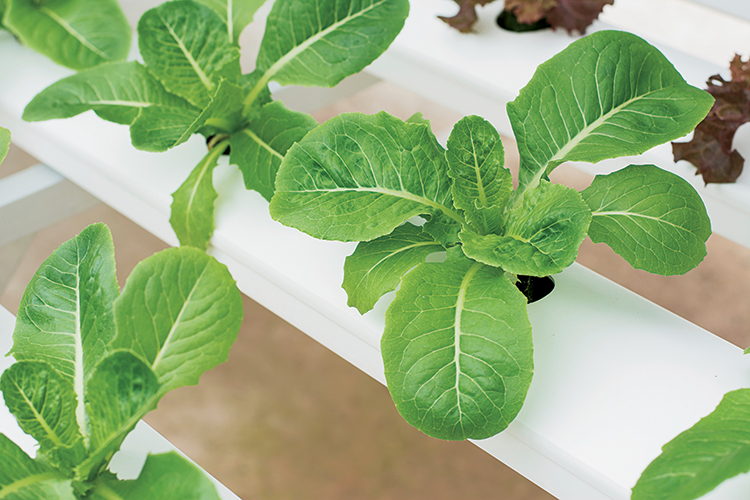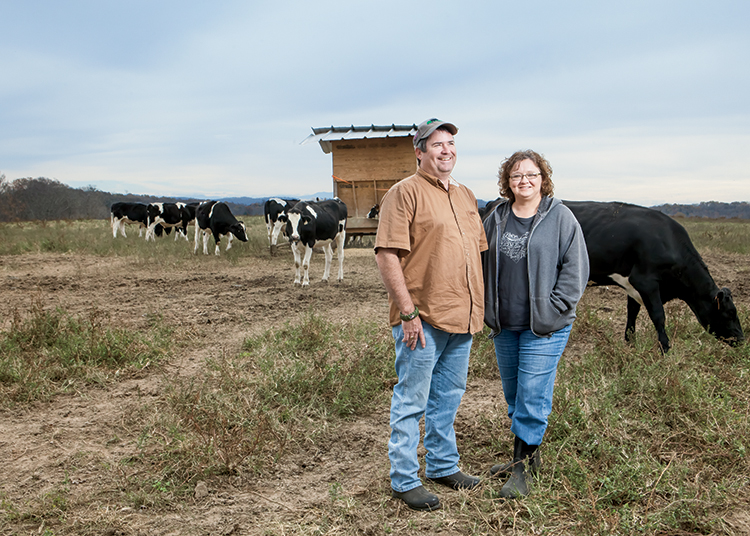Home > Tennessee > Tennessee Technology > More Than Tradition: Innovative Farming in Tennessee
More Than Tradition: Innovative Farming in Tennessee
In partnership with: Tennessee Department of Agriculture

A few decades ago, the typical American farm would conjure images of hundreds of acres of crops growing on rolling fields spanning the countryside. Mentions of indoor farming would be be few and far between. Today, that’s changing.
“Growing up, my family’s land was surrounded by pastures, fields and wooded areas as far as we could see. The idea that these key resources might be considered scarce never entered my mind,” says Ed Harrison, co-owner of SmarterGardens in Columbia. “Today, however, there are plenty of studies to support the position that the world’s supply of cropland won’t be able to keep pace with overall population growth.”
SmarterGardens is just one of several innovative Tennessee farms choosing to address this issue with hydroponic farming methods. The approach uses no soil, instead adopting a closed-loop system that circulates nutrient-rich water across the plants’ roots. Harrison says this method produces zero soil erosion, uses about 90 percent less water than traditional agriculture methods and reduces fertilization requirements. Hydroponics are also typically grown vertically on 8-foot-tall structures, so farms like SmarterGardens can produce 50 times more than a traditional growing environment on a per-square-foot-per-year basis.
Still a relatively new venture, Harrison and his business partner, Jordan Taaffe, founded SmarterGardens a couple years ago. They currently grow greens, herbs and peppers in a 340,000-square-foot facility in Middle Tennessee.
“The fact that we can build our systems inside virtually any building opens the possibility of constructing farms closer to urban populations and operating them year round,” Harrison says. “This reduces transportation expenses, gives consumers a fresher product and provides farm workers with year-round employment.”
Jeffrey Orkin adds that a huge benefit of vertical hydroponics is that crops aren’t affected by seasons or weather.
“We’re eliminating food miles by growing in a method that doesn’t have seasons. I like to say ‘we never have a cloudy day,’ ” he says.
Orkin founded Nashville-based Greener Roots farm, which produces several different varieties of hydroponic lettuces and herbs. With a background in landscape architecture and a passion for sustainability, he began experimenting by growing plants in the windows of his downtown Nashville apartment. After learning a few hard lessons through trial and error, Orkin rented an empty warehouse in April 2014 and planted his first seeds that July.
Greener Roots currently supplies acclaimed local restaurants, including Husk, Sinema, SLOCO, The 404 Kitchen, Catbird Seat and more, as well as several markets such as The Turnip Truck, with high-quality greens year round.
He says hydroponics could never replace conventional agriculture, but especially as populations become denser, taking over abandoned warehouses to turn them into agricultural hubs is an exciting thing.
“Because of the conditions we grow in, we produce very high-quality, consistent products,” Orkin says. “Chefs appreciate that. They like to know the farmer and see the farm. Locality is certainly an aspect, but quality is also very important.”

John Mitchell agrees. A sixth-generation farmer in Grainger County, Mitchell farms with conventional methods. He started out with a dairy operation but transitioned to producing only beef. He decided to move the farm in the direction of high-quality hamburgers, and with a couple hundred head of Holstein steers, Mitchell began taking the product to local farmers markets.
A Knoxville chef caught wind of the ground beef and called them for a sample.
“One thing led to another, and they opened a gourmet hamburger restaurant on Market Square in Knoxville called Stock and Barrel. We supply all their hamburger – several head per week,” Mitchell says. “They’ve been voted best hamburger by reader polls two years in a row, and TripAdvisor ranked them the No. 5 best hamburger in the U.S.”
He says though he farms conventionally, it took innovation and adaptation to find a direction for their farm that kept them viable.
“What worked for us was cutting out the middle man and going farm-to-table with beef. I take out filets, rib-eyes and New York strip cuts, but the rest of the steer goes into the hamburger. I want to produce and supply a top-quality burger,” Mitchell says.



